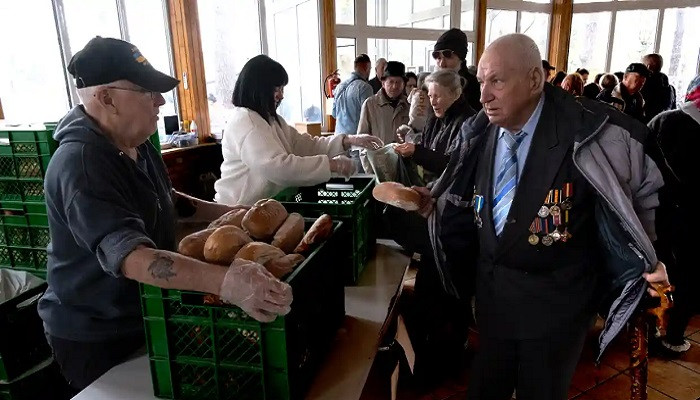+27 °C, +14 °C ... +27 °C Tomorrow:+28 °C

In the Treasure pawn shop in Kyiv, Oleksandra, 40, a well turned out woman in a hooded wool coat and Nike trainers, has come to redeem her sewing machines. Like all those visiting the store, she does not want to give her family name. She says that when Russia invaded Ukraine in February 2022, she was working as an accountant for a firm that employed 14 people, who were all laid off because of the conflict. Since then she has struggled to find regular work. With savings running out, like many others in Kyiv, she turned to pawning her possessions to get by, only finding a job a year later that allowed her to claim back her machines. Those who can afford it, he says, will come back to get their goods within two weeks. Almost half, he adds, will not, leaving Treasure to sell on the items from a back room with displays of phones and watches. “People are struggling because of the war. They don’t have money.” Many have lost their jobs, he says, while prices have skyrocketed even for those who have jobs. The scene in the pawn shop illustrates the crisis of growing poverty in Ukraine, the reality of which stands in contrast to the surface bustle of Kyiv’s busy restaurants and bars where it is often hard to get a table, with many living a precarious existence. Poverty increased from 5.5% to 24.2% in Ukraine in 2022, pushing 7.1 million more people into poverty with the worst impact out of sight in rural villages, according to a recent report by the World Bank. With unemployment unofficially at 36% and inflation hitting 26.6% at the end of 2022, the institution’s regional country director for eastern Europe, Arup Banerji, had warned that poverty could soar. Behind his window in Treasure, Stepanov describes the hardships experienced even by those who have work. “The price of everything has gone up. Food is the most expensive and then it is fuel for the car. Some things have gone up by 40-50%. Before the war my wife would go to the supermarket to shop and it would cost 200 hryvnia, now the same shop costs 400-500.” Elsewhere damaged buildings are being repaired, cranes and work crews busy. But while the ground war long ago receded from Irpin, the economic consequences of conflict are still being felt sharply in a town where the population has been swelled by internally displaced fleeing the frontlines in the south and east. The most visible sign of the poverty crisis can be found at a protestant church in the town where priests have set up six distribution centres for free bread across the area, the busiest in Irpin itself. There, on most days, about 500 people can be found queuing for a free loaf, with tables and a tent also set up outside the centre on the day the Guardian visits, offering free secondhand shoes, clothes and children’s toys. One resident of Irpin, Veronika Pravyk is looking through the clothes and trying to find free nappies and baby milk for her toddler, which are sometimes available but not today. She tells a typical story. Working in retail before the war, the 30-year-old lost her job and fled with her family to Spain for six months where she burned through her savings before returning to Ukraine in the autumn. “I’m not working but my husband is,” she says. “But all the prices have gone up because of the war and my husband’s salary buys less than it used to because of the falling exchange rate with the dollar. We still have to find the money to pay for our apartment and to heat it during this past winter. I just never imagined we would be living like this. Before the war we managed everything. It’s very difficult and everyone is suffering the same.” |
MAMUL.am - News from Armenia, Artsakh (Nagorno-Karabakh) and the world
Republication or redistribution of MAMUL.am content is expressly prohibited without the prior written consent.
Address: 1 Charents str., Yerevan, Republic of Armenia.
Tel.: +374 (10) 55-20-59
E-mail: info@mamul.am
Tel.: +374 (91) 99-22-02
E-mail: marketing@mamul.am






























